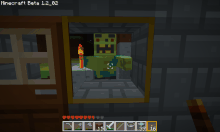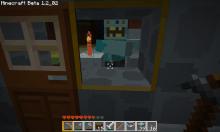I have started working on a little utility program for assembling Minecraft texture packs. Its working title is Minecraft Texture Maker. With it I an do mundane tasks like assembling the files in a directory in to the ZIP archive that gets published, and also create new texture packs by remixing existing ones. I have a vague ambition to elaborate it in to a web app for remixing packs, but it is useful already.
Building Texture Packs
Packs are created using recipes written in a fairly simple-minded syntax: JSON. For example, to build GroovyStipple, I use this recipe:
{
"label": "GroovyStipple R7",
"desc": "A high-visibility, unrealistic look",
"mix": {
"pack": {"file": "GroovyStipple"},
"files": [
"gui/*.png",
"item/*.png",
"mob/*.png",
"news.txt"
"pack.png",
"terrain.png"]}}
This goes in a file groovystipple.json. The graphics
files—terrain.png and the rest—go in a directory GroovyStipple
(the source pack, referred to in the pack line). Then I can build the pack with the
command like this:
maketexture texturepacks/groovystipple.json
The recipe for SmoothStipple is a little more complex, because it has
its own terrain.png and pack.png, but gets everything else from
GroovyStipple:
{
"label": "SmoothStipple R7",
"desc": "A high-visibility, unrealistic look",
"mix": [
{
"pack": {"file": "GroovyStipple"},
"files": [
"gui/*.png",
"item/*.png",
"mob/*.png",
"news.txt"]},
{
"pack": {"file": "SmoothStipple"},
"files": [
"pack.png",
"terrain.png"]}]}
The folders GroovyStipple and SmoothStipple contain the graphics
files but are not complete packs in themselves. The program takes care
of creating pack.txt, for example.
Remixing Texture Packs
Many packs have alternative versions of some of the textures.
Frenden has alternative cobble textures, not to mention two darker
shades of wood for people who do not like the look of the default planks
texture. Texture maker recipes can build a new terrain.png by
rearranging the existing one:
{
"label": "Frenden 6A (alt cobble)",
"desc": "Uses alternative cobble and dispenser textures",
"mix": {
"pack": {
"file": "Frenden6_1a.zip",
"maps": {
"terrain.png": [
{
"source_rect": {"width": 256, "height": 48},
"cell_rect": {"width": 16, "height": 16},
"names": [
"grass", "stone", "dirt", ...
"cobble", "bedrock", "sand", ...
"gold_ore", "iron_ore", "coal_ore", ... ]},
{
"source_rect": {"x": 64, "y": 160, "width": 256, "height": 32},
"cell_rect": {"width": 16, "height": 16},
"names": ["cobble1", "planks1", "planks2", "dispenser1"]}]}},
"files": [
"*.png",
{
"file": "terrain.png",
"replace": {
"cells": {
"cobble": "cobble1",
"dispenser": "dispenser1"}}},
{
"file": "mob/zombie.png",
"source": "mob/zombieBlue.png"}]}}
(The elipses ‘...’ show where I have abbreviated the list of names.) In this recipe, the maps
section says how to find named textures in terrain.png, and the
replace section tells it to replace the usual cobble texture with
the one named cobble1, and so on.
The result (Frenden6_1a_alt.zip) is a new texture pack that can be copied in to Minecraft’s special folder, giving a choice of looks:
The standard pack is on the left; the alternates pack on the right. (Click to see larger.)
I use similar scripts to keep the ‘alt’ versions of GroovyStipple and SmoothStipple up to date.
Status
As of 5 February 2011 I have the basics of recipes working and a simple
script that loads a recipe and creates the pack. I have not yet added
support for automatic installation (that is, I need to add a setup.py
file), so for now it is only useful to Python programmers. I plan to add
a basic setup.py real soon now to see whether other texture-pack
designers find it useful. There is a wiki with the roadmap, such as
it is.


